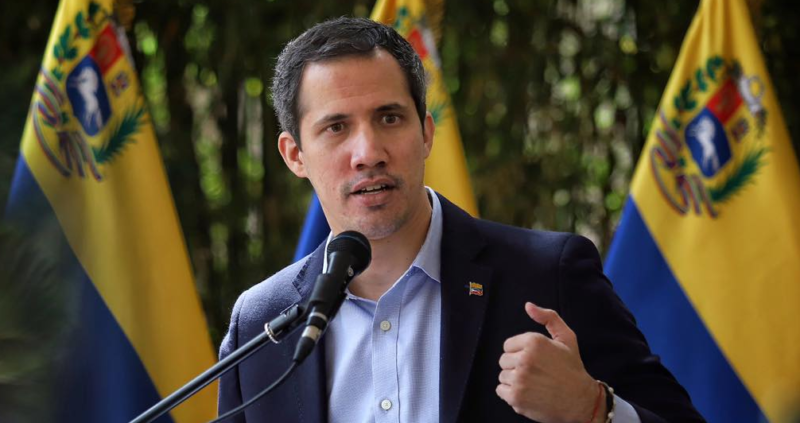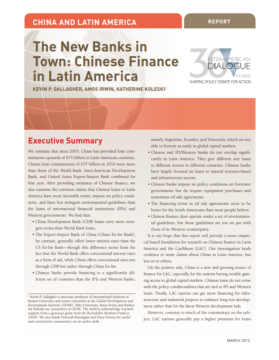Hugo Stay Home
Hugo Chavez, the Venezuelan president, has clearly been enticed by the Libyan drama, where his longtime friend and ally, Muammar al-Qaddafi, is under siege from rebel forces.
A Daily Publication of The Dialogue
Venezuela’s opposition-run National Assembly on Jan. 3 extended for one year Juan Guaidó’s mandate as the country’s internationally recognized interim president. However, the opposition legislators also curtailed Guaidó’s power–more tightly restricting whom he can appoint to the ad hoc boards of state-owned oil company PDVSA and U.S.-based refiner Citgo, and requiring him to report monthly on the actions of his government. What is Guaidó achieving in his current position? What will be the practical effects of the restrictions on him? How will Guaidó’s reappointment and the new restrictions affect Venezuelan assets held outside of the country, including $1.9 billion worth of Venezuelan gold that is stored at the Bank of England?
Vanessa Neumann, CEO of Asymmetrica and former Juan Guaidó-appointed Venezuelan ambassador to the United Kingdom: “The renewal of Guaidó’s mandate into 2022 was both foreseeable and foreseeably contentious. There were enormous worries both within the U.S. government and the British government that the ‘G4’ political parties would rotate Guaidó out for someone else. The effort to do so was in fact led by Guaidó’s own foreign minister (my former boss), Julio Borges, who has long undercut the efforts of Guaidó, his boss, because they come from rival parties. His effort ultimately was as irrelevant as a fallen tree in the forest that no one hears. That plot, however, is symptomatic of so much of what has been wrong with Guaidó’s mandate since 2019: he is too beholden to the coalition of parties that divides a fake power pie among themselves before they are in the real power of territorial and institutional control; it is not tied to real power, but rather to access to funding resources, from Citgo and bonds to international pro-democracy aid. That Venezuelan opposition political infighting has hampered the effectiveness of those of us who signed up to ‘kick in the door before dawn.’ I personally fought very hard for Guaidó’s continued recognition by the United Kingdom well past my resignation, and am deeply gratified by the U.K. Supreme Court’s historic decision on Dec. 20—a great Christmas present to Venezuelan democracy. However, the cut in funding from the European Union and the United States should focus opposition minds. While it is both necessary and right for Guaidó’s mandate to be renewed, everyone else should be eliminated, and a new bench of the serious and clean and representative (including women and minorities) should be seated and seriously considered for backing by Venezuelans and the international community.”
Diego Arria, member of the Advisor board, director of the Columbus Group in New York and former permanent representative of Venezuela to the United Nations: “Since day one, the National Assembly has been undermining Guaidó’s role when, in violation of the Constitution, it refused to swear him in as interim president of Venezuela. The four political parties that control the Assembly did not want an independent Guaidó, and they proceed to create a parliamentary government with Guaidó as its head, but under its absolute command. This illegal procedure has allowed them to be the real forces in charge of the interim government, using it as an employment agency for their members and appointing them to boards of state-owned companies such as Citgo, Monomeros and PDVSA, and as ambassadors and advisors, while preserving Guaidó as a mouthpiece, only because without him they would cease to exist. The present Assembly recreated itself as a ‘Comision Delegada,’ a small number of representatives dominated by the four parties, which refuse to separate the legislative and the executive powers, keeping Guaidó as president of both. However, on Jan. 3, they continued to minimize his role, subordinating him even more to them. Guaidó did not contest this decision, following his own political party line, even though he had promised to be free of political subordination to Leopoldo López and to his party, Voluntad Popular. Venezuela does not need an interim government such as this one to protect its assets held outside the country because the U.S. government will protect those in its jurisdiction, and the United Kingdom will protect the gold deposited in the Bank of England. Both are trustful and transparent, in stark contrast to Venezuela’s interim government.”
Patrick Duddy, director of Duke University’s Center for Latin American and Caribbean studies and former U.S. ambassador to Venezuela: “The decision by Venezuela’s opposition-run National Assembly (NA) to extend Juan Guaidó’s mandate as interim president accomplished three things. First, it reaffirmed the opposition’s determination to challenge the regime with a united front as it presses for free and fair elections. Second, by endorsing Guaidó, the NA effectively marginalized prominent opposition dissidents Julio Borges and Henrique Capriles Radonski, both of whom had called on the opposition to abandon its insistence that the Guaidó-led interim government (IG) should be the sole opposition vehicle for confronting the Maduro regime. The endorsement of Guaidó and the IG also implicitly sent a message to those in the European Union who have quietly been looking for an alternative approach to that of the IG. Finally, the extension of Guaidó and the IG’s mandate assures the opposition of both a structure and leadership for engaging with the regime over the next year. The NA did impose some budgetary and bureaucratic restraints on Guaidó’s executive authorities governing spending and appointments, but these restraints are unlikely to interfere with the IG’s ability to interact with foreign governments and negotiate with the Maduro team if and when the regime returns to the negotiations in Mexico. This last point is important. The regime’s stunning losses last Sunday of the governorship in Barinas, Hugo Chávez’s home state, and in the many municipalities the opposition won in last November’s regional elections validate the opposition’s decision to participate in the political process despite the many egregious obstacles and limitations that the regime imposed upon them. This demonstration of strength by the opposition and the evidence of erosion in regime support in the heartland of Chavismo should somewhat reanimate the opposition’s domestic support and encourage the IG’s international partners to stay the course.”
Steve Ellner, associate managing editor of Latin American Perspectives and retired professor at Venezuela’s Universidad de Oriente: “The decision of the opposition-led National Assembly to extend Juan Guaidó’s mandate and to create mechanisms to halt the corruption and mismanagement associated with his parallel government is predicated on a false assumption. The deputies of the opposition National Assembly assume that Guaidó is widely viewed as the nation’s legitimate president and that regime change is just around the corner. Nothing could be further from the truth. Developments since Guaidó proclaimed himself president three years ago—including regime change plots ending in fiascos and denunciations of corruption— have resulted in a steady erosion of support among his allied parties, within the opposition as a whole, in the region and worldwide. Thus, the U.N. General Assembly’s vote in December on the recognition of the Maduro government finished with 177 in favor and only 16 against, meaning that the vast majority of the 58 nations that had recognized Guaidó as the legitimate president no longer do so. At the same time, Julio Borges, who was one of Guaidó’s staunchest supporters, resigned as his foreign minister and declared that the interim government was nothing but a top-heavy bureaucracy. Borges thinks Guaidó’s interim government should ‘disappear’ with the exception of the management of foreign assets, which should be administered more efficiently. Nevertheless, without a legitimate ‘interim’ president, the opposition has no justification for controlling Venezuela’s foreign holdings. Moreover, with the implosion of Guaidó’s popularity and his loss of recognition as the nation’s legitimate president, the mismanagement of the multi-billion dollar assets that were turned over to him may be a foregone conclusion.”
Gabriel Hetland, assistant professor of Latin American, Caribbean and U.S. Latino Studies at the State University of New York at Albany: “The sooner Juan Guaidó goes, the better. This is not only my view, but also that of Venezuela’s main opposition leaders, and—if polls are to be believed—the vast majority of the Venezuelan people. Just weeks ago, three of Venezuela’s four main opposition parties were calling for Guaidó to step aside. And in several polls last year, Guaidó’s support among Venezuelans was significantly below that of Nicolás Maduro. In a poll last August, just 3 percent of respondents expressed ‘very favorable’ feelings toward Guaidó, while 12 percent felt this way about Maduro. This scorn is well deserved. In his three years as the country’s self-proclaimed interim president, Guaidó has succeeded in little besides maintaining the support of the United States and other foreign governments. Guaidó’s promises to ‘end the dictatorship’ have repeatedly fallen flat. He has instead served, at various points, as a rallying pole for far-right calls for U.S. invasion and the continuation of utterly debilitating U.S. sanctions. He has also succeeded in commanding tremendous assets abroad, but there is scant evidence that this has benefited the Venezuelan people in the slightest. Why, then, is Guaidó still on the scene? Because the United States has decreed it. This is the reason Primero Justicia and other opposition parties begrudgingly renewed Guaidó’s claim to serve as interim president. If past is prologue, Guaidó’s presence will simply prolong Venezuelans’ suffering by maintaining opposition disunity, providing Maduro a credible rallying cry and inhibiting progress toward resolving Venezuela’s manifold problems.”
 The Latin America Advisor features Q&A from leaders in politics, economics, and finance every business day. It is available to members of the Dialogue’s Corporate Program and others by subscription.
The Latin America Advisor features Q&A from leaders in politics, economics, and finance every business day. It is available to members of the Dialogue’s Corporate Program and others by subscription.
Hugo Chavez, the Venezuelan president, has clearly been enticed by the Libyan drama, where his longtime friend and ally, Muammar al-Qaddafi, is under siege from rebel forces.
Estimates of the volume, composition, and characteristics of Chinese lending to the region since 2005.
Is the Venezuelan government likely to comply with the IACHR’s ruling or will it uphold the ban?
 Venezuela’s Juan Guaidó was tapped for another year as the country’s internationally recognized interim president, but with diminished power. // File Photo: Facebook Page of Juan Guaidó.
Venezuela’s Juan Guaidó was tapped for another year as the country’s internationally recognized interim president, but with diminished power. // File Photo: Facebook Page of Juan Guaidó.
